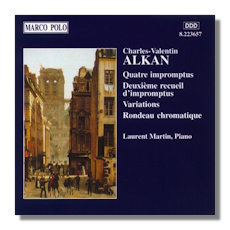
The Internet's Premier Classical Music Source
Related Links
- Alkan Reviews
- Latest Reviews
- More Reviews
-
By Composer
-
Collections
DVD & Blu-ray
Books
Concert Reviews
Articles/Interviews
Software
Audio
Search Amazon
Recommended Links
Site News
 CD Review
CD Review
Charles-Valentin Alkan

Piano Works
- 4 Impromptus Op. 32/1 (1848)
- 4 Impromptus Op. 32/2 (1849)
- Variations on a Theme from Steibelt's Piano Concerto "L'Orage" Op. 1 (1828)
- Rondeau chromatique Op. 12 (1833)
- "Alleluia" Op. 25 (1844)
- "Salut, cendre du pauvre!" Op. 45 (1856)
- Paraphrase in Psalm 137 "Super flumina Babylonis" Op. 52 (1859)
Laurent Martin, piano
Marco Polo 8.223657 (Naxos) 67min
By far the best pieces in this collection are the later ones, dating from 1848-59: the fourth impromptu (titled 'Faith'), Hail, Ashes of the Poor!, and By the Waters of Babylon, all of which have dark, ominous overtones. At 8:25, 'Faith' is the most elaborate of the impromptus. Its stiff and formal opening is abruptly interrupted by powerful funeral music in Chopin's style – but with strikingly original harmonies, odd rhythms, and a walking bass that presages American boogie-woogie! Hail is an outpouring of grief written a year after the composer's father died. Arpeggios in the piano's lowest register preface a solemn, chorale melody. Again a funeral march is the centerpiece of the composition. Here Alkan uses the piano's bass notes to effectively mimic the sound of a drum. Babylon begins with a gentle meditation on the text of the 137th Psalm, leading to an arresting and dramatic middle section.
The remaining impromptus are interesting and generally brief (three are less than two minutes long). The final four experiment with meters of five and seven, which is quite unusual for their time. Only the last – with its relentless emphasis on the final two beats at the end of nearly every measure and an undistinguished, recitative-like melody – outstays its welcome. Hear the cloying, utterly conventional theme by Daniel Steibelt that Alkan used for his first published work, and you'll understand instantly why Steibelt has been totally overshadowed by his one-time rival, Beethoven. The melody is a close relative of 'Pop Goes the Weasel', and Alkan's variations heap decorations upon it with all the subtlety and imagination of a department store Christmas tree. (The Grand Prize for "Liner Note Understatement of the Year" goes to Keith Anderson who contends that these variations "…may lack deeper musical substance…" The notes are otherwise quite informative.) The Rondeau, on the other hand, sounds for all the world like the background music from a (very bad) silent movie, complete with sinister villain, naïve heroine, and a dashing hero who comes to her rescue just in the nick of time. Pieces like these – not to mention the vapid Alleluia – certainly do nothing to enhance Alkan's reputation.
As Martin has demonstrated in other recordings from this series, he is a perceptive and sensitive interpreter of Alkan's work whose considerable dexterity ensures that even the most difficult passages are always technically secure. The piano sound is vivid and full-bodied. Recommended, especially to Alkan's many fans, as a refreshing alternative to yet another Chopin or Liszt recital.
Copyright © 1996, Thomas Godell



















